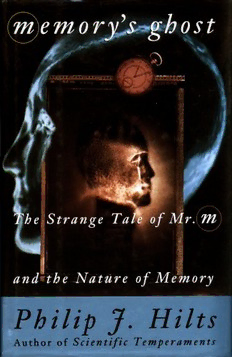Table Of ContentJ.
Philip Hilts
Author of Scientific Temperaments
Memory's
Ghost
The Strange Tale of Mr. M.
and the Nature of Memory
Philip ,. Hilts
Simon 6 Schuster
New York London Toronto Sydney Tokyo Singapore
• SIMON 6 SCHUSTER
Rockefeller Center
1230 Avenue of the Americas
. New 'lOrk, NY ·10 020
Copyright © 1995 by Philip J. Hilts
All rights reserved,
including the right of reproduction
in whole or in part in any form.
SIMON 6 ScHUSTER and colophon are registered trademarks of
Simon 6 Schuster Inc.
Designed by Levavi 6 Levavi
Manufactured in the United States of America
1 3 5 7 9 10 8 6 4 2
Library of Congress Cataloging-in-Publication Data is available.
ISBN 0-684-80356-9
ToH.M.:
All the conduits of my blood froze up,
Yet, hath my night of life some memory,
My wasting lamps some fading glimmer left,
My dull deaf ears a little use to hear:
All these old witnesses, I cannot err,
Tell me thou art my son ...
-SHAKESPFARE,
Comedy of Errors
Preface
Memory, so familiar to us as a private act, becomes strange
as a subject of inquiry. We know it personally, as we know our
limbs; we depend on it as we depend on food or shelter; we en
joy it as we enjoy a comfortable pair of shoes and favorite suit of
clothes.
But we can hardly imagine what it is. We have trouble linking
our own experience of memory with the scientific-sounding ex
planations involving computer storage, brain parts and cellular
chemistry.
Now there is a greater reason to try to find the way,t o explain
these events of experience. Just in the past two decades, the
ways of memory have begun to be understood for the first time
in detail and greater progress has been made in that time than
in the previous three thousand.
The first efforts to relate this news have, for the most part,
failed to go beyond technical discussions. They have related little
of the history of memory, they have not explained why humans
have the skill in the first place, and they have not described it
working in natural human settings. I think to understand the
subject in its new light, we need to glimpse the literature and
8 Preface
history of the subject, in addition to the science. So, I have here
tried to view the science of memory with a writer's eye.
Because of these considerations, and practical ones, I have
chosen an unconventional mix of literary style and scientific
material in this book, to try to give life to a subject I find com
pelling. Ultimately, we must obtain understanding from both
knowing and feeling, from science and literature, and so I have
tried here to mix those volatile elements.
The book which follows has its hazards; it enters the territory
of two warring tribes, those literary and those scientific. Scien
tists may be displeased at points left vague and details sacrificed
to keep the narrative afoot. Those readers of literary bent may
want more of the life of Mr. M. that is just not available. (The
book might well be called a biography of a man with no life.)
Others will want a closer examination of the scientists here:
what did they say here, and what was their motive there.
The subject of the book is memory, described as an explo
ration of one case and the side-journeys that case prompted. As
there are already books describing the scientific detail, more of
that is not essential here. As for the literary values, more per
sonal detail about H.M. would certainly help make a fuller por
trait, but it simply cannot be obtained within practical limits.
As for the question of how this subject relates to modem psy
chiatry, I think that the rapidly expanding field of neuroscience
will gradually create a new psychology. This does not mean that
Dr. Freud, who championed inner mental life, or Dr. Watson,
who concentrated on behavior, must be left behind. Rather, we
must incorporate the insights of past thinking into new forms.
We realize now that Dr. Freud was incorrect in his assessment of
memory: it is not a complete record waiting to be unearthed.
On the other hand, his humane approach which put each per
son at the center of his own struggle, and set the professional
therapist as a guide, need not depend on such a mistaken detail.
The human-centered approach of Dr. Freud was the beginning,
not the end, of psychiatry.
(In therapy, we now know, we are in fact creating the mean
ing of our memories, recasting them in new roles, so that we
may understand the story of our lives in a positive manner, a
Preface 9
manner tha't permits us to get on ,with living, For patients, the
recreated meaning of our memories may be more important
than the memories themselves. Of course, outside the personal
therapy session, these memories may be dangerously misleading
if taken as fact. They can be used reliably only privately. We
make the stories of our lives from both fact and imagination.)
The person at the center of this book is Mr. M. himself, and
what appears here includes the memories of Mr. M. as he tells
them. I have chosen to believe these reminiscences in the narra
tive, though he is inconsistent in his recollections. I use the
most prominent versions he describes, checked where possible
against known facts. There is so little of his life we have, and it is
all he has, that I felt that the only reasonable and dignified path
was to accept some of what he remembers, uncertain though it
maybe.
So follows an account from science and literature, with de
tails personal and impersonal detail, with facts certain and un
certain, in an effort to tell the tale of memory and Mr. M.
Part I

